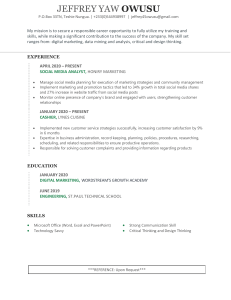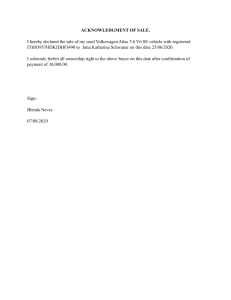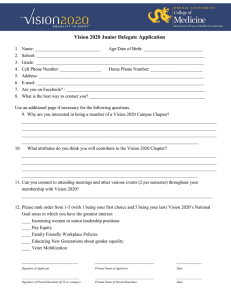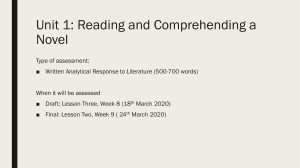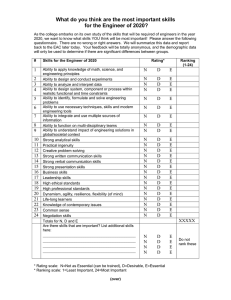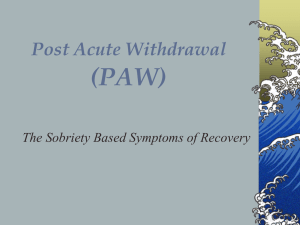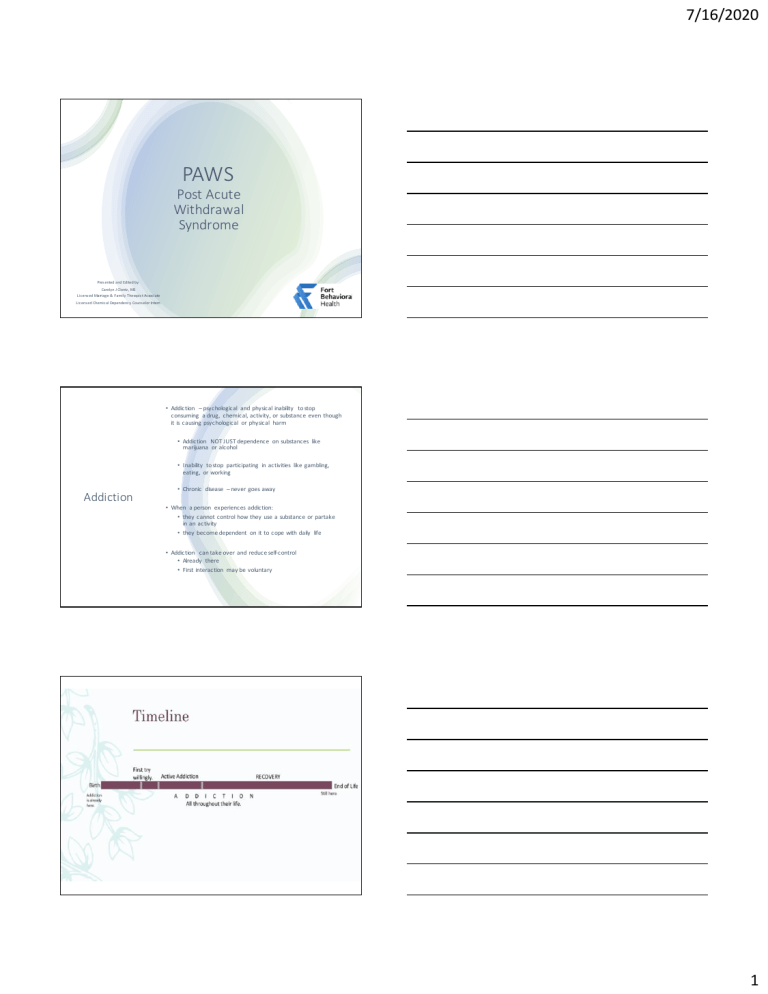
7/16/2020 PAWS Post Acute Withdrawal Syndrome Pres ented and Edited by Carolyn J Clontz , MS Licens ed Marriage & Family Therapis t As sociate Licens ed Chemical Dependency Couns elor Intern • Addiction – psychological and physical inability to stop consuming a drug, chemical, activity, or substance even though it is causing psychological or physical harm • Addiction NOT JUST dependence on substances like marijuana or alcohol • Inability to stop participating in activities like gambling, eating, or working Addiction • Chronic disease – never goes away • When a person experiences addiction: • they cannot control how they use a substance or partake in an activity • they become dependent on it to cope with daily life • Addiction can take over and reduce self-control • Already there • First interaction may be voluntary 1 7/16/2020 • What things did you experience during your using days? • Cravings, lows, highs, want v. need Withdrawal vs. Post Acute Withdrawal • What happens when you stop using— especially during the first one or two weeks? • This is typically the Acute Withdrawal time. A syndrome that alcohol and drug addicts experience in early recovery What is PAWS? A bio-psycho-social syndrome which results from the combination of damage to the nervous system caused by drugs and the psychosocial stress of coping with life without drugs Addiction is not just a disease of using/drinking but a disease of early sobriety The presence of brain dysfunction has been documented in 75-95% of the recovering alcoholics/addicts Th e B rain is i mpacted long af t er thi s first few days after y o u stop using. • If people don’t understand these symptoms, that can increase the chance of relapse. • But the more you know about them, the better you can learn to deal with them. 2 7/16/2020 Two Things to Remember • 1. The damage to the brain is usually reversible—things will get better—there is no need to fear. • 2. With a good recovery program and not using alcohol or other substance, your brain can get back in balance. • Neuroplasticity Why? These symptoms result from the body’s struggle to heal the damage done by drugs and alcohol. Symptoms Inability to think clearly Memory problems Emotional overreactions or numbness Coordination problems Oversensitivity to stress Sleep disturbances 3 7/16/2020 Onset: symptoms start 7 to 14 days after quitting Onset, Duration, and Severity Duration: symptoms of PAW grow to peak intensity over three to six months after abstinence begins. Severity: depends on the degree of brain dysfunction caused by the addiction and the amount of psychosocial stress experienced in recovery Resilience is key!! Onset, Duration, and Severity Nervous system damage usually required from six to 24 months with a healthy recovery program Often those 30, 60, 90, 4 & 6 month, and 1 & 2-year sobriety dates seem to be "triggering" times for PAW symptoms Often PAW symptoms appear to come and go without apparent reason or pattern May last up to 10 years Recovery from the damage caused by the addiction requires abstinence. The damage itself interferes with the ability to abstain. Use of alcohol or other drugs can temporarily reverse the symptoms of the damage. If loved ones drink or use, they will think clearly, have normal feelings and emotions, even feel healthy for a little while. Unfortunately, the disease will eventually trigger a loss of control that will again destroy these functions. 4 7/16/2020 Not So Fun Fact…. Heroin addicts who have been clean and sober for many years will experience opioid withdrawal symptoms such as nausea, diarrhea and stomach cramps after being shown films of a person preparing heroin for injection! Have a hard time concentrating & paying attention. Thinking Problems Having rigid, repetitive thinking. Difficulty dealing with non-concrete (abstract) concepts or ideas. Short term memory: • Hear something and understand it, and 20 minutes later you can’t remember it. Memory Problems Long term memory: • Sometimes, under stress, can’t remember important events from the past. They aren’t gone, just forgotten for the moment. 5 7/16/2020 Emotional Problems 1 Over-reaction to situations-everything becomes a “big deal.” 2 When the stress gets too great, tend to “shut down”—become emotionally numb. Sleep Problems • Unusual or disturbing dreams. • Hard to fall asleep. • Difficulty staying asleep. • Restless sleep; don’t feel rested when you awake. • Changes in sleeping/awake cycles. Trouble with balance Dizziness Physical Coordination Problems Poor eye/hand coordination Clumsiness Accident Prone Slow reflexes 6 7/16/2020 Difficulty dealing with Stress Can’t recognize stress at low levels. Over-react when stress is recognized. May do things inappropriate for the situation. Other PAW symptoms become worse under stress. • You may feel— • Embarrassed • Filled with Shame • Feel inadequate or “less than others” No wonder I have a hard time getting along • OK, Show me how to deal with this….. What To Do The first is to understand that PAW is a normal part of recovery Learn & use coping strategies for unavoidable stressful situations This too shall pass Avoid stressful situations as much as possible 7 7/16/2020 • Good nutrition • Exercise Strategies • Relaxation • Stabilization • Education • Stress Reduction Stabilization Get regular feedback from those you trust: • Therapy group • Professional counselor/doctor • Self-help group • Sponsor Verbalize: Need to talk about what your experiencing. • Talk to people who are not going to accuse, criticize, or minimize. • Become self aware of symptoms. • Need reality checks. Recovery Tools Problem Solving and Goal Setting: • Identify and Clarify the Problem • Identify options and best possible outcome • Get feedback if needed • Act and review outcome 8 7/16/2020 Recovery Tools Backtracking: If something isn’t going well, stop and look at when things got off track. What could be done differently? Were there any PAW symptoms? How can you get back on track? Education Learn about addictive disease recovery and PAW symptoms Understanding helps relieve anxiety, guilt, and confusion about what you are experiencing Learn to handle things one at a time to avoid feeling overwhelmed • Taking a walk • Daydreaming • Laughing • Playing • Music Stress Reduction • Reading • Singing • Taking a hot bath • Soaking your feet • Massage • Relaxation tools • Deep Breathing • Tense/Relax muscles 9 7/16/2020 Nutrition • Poor nutrition leads to poor health which leads to stress • Establish new eating habits and stick with them • 3 meals/2 snacks a day • Beware hypoglycemia small glucose loads • Adequate protein and carbohydrates It relaxes, calms, and reduces tension. EXERCISE Relaxation Rediscover enjoyable activities that help reduce stress Reading, sports, meditation, spending time with friends and family, hobbies and other activities greatly reduce stress Pick an activity that is enjoyable and do it often 10 7/16/2020 Spirituality as a key to healthy recovery: • One of the ways to deal with early recovery is to have an active relationship with a power greater than yourself. Spirituality • Meditation: Practice listening to your Higher Power • Prayer—conversation with your Higher Power Spirituality • Turning it over • Letting Go • Journaling—keeping a personal record of thoughts, feelings, ideas • Spiritual Fellowship - friendship based on shared spirituality SIMPLICITY GROWING SPIRITUALLY ONE STEP AT A TIME Personal Inventory: In the morning to plan the day In the evening to review the day 11 7/16/2020 Summary • Post acute withdrawal is a bio-psycho-social syndrome that affects people in early recovery • Understanding the symptoms and using strategies to cope with stress can greatly reduce the severity of symptoms • This too shall pass 12
